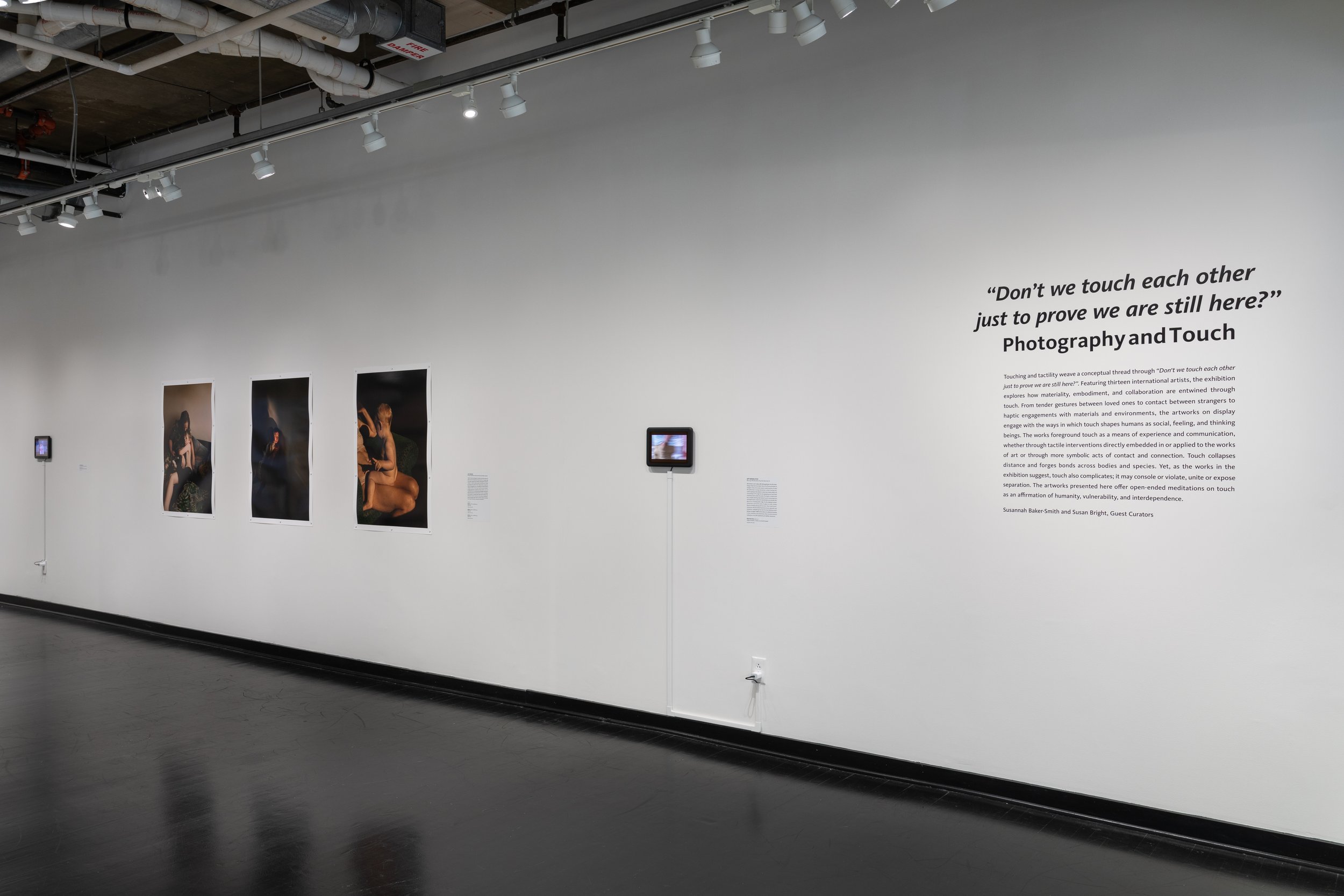“Don’t we touch each other just to prove we are still here?”: Photography and Touch
“Don’t we touch each other just to prove we are still here?”: Photography and Touch, 2024. Courtesy of the Princeton University Art Museum. Photo by: Joseph Hu.
PRINCETON, NJ – “Don’t we touch each other just to prove we are still here?”: Photography and Touch, opened on May 11 at the Princeton University Art Museum’s Art at the Hulfish gallery it will be on view until August 4, 2024, and it will explore the role that physical touch plays in our lives and how it is represented in the work of contemporary photographers.
Originally conceived in the depths of the COVID-19 pandemic, when lockdowns and other restrictions led to widespread feelings of isolation and loneliness, the exhibition is devoted to the ways in which lens-based artists have represented touch—the embodiment of connection. The exhibition includes works by the artists Lisa Sorgini, Clifford Prince King, Katrine de Blauwer, Richard Renaldi, Odette England, and Tabitha Soren, among others.
Richard Renaldi(born 1968, Chicago, IL; activeNewYork, NY), Touching Strangers - Chris and Amaira, IL, 2013. Inkjet print; 127 × 152.4 cm. Collection of the artist © Richard Renaldi
While exploring this subject, guest curators Susannah Baker-Smith and Susan Bright became interested in the relationship between touch and the medium of photography. The exhibition proposes that this connection is both inclusive—spanning all possible kinds of relationships— and diverse—relevant to many different approaches and lens-based processes. As such, Photography and Touch includes photographs and snapshots, videos, artist books, fine art prints, and works made for Instagram.
Core themes explored in the exhibition include materiality, affect, embodiment, collaboration, and how the medium of photography can explore touch as a broader sensory and material experience. The exhibition takes its title from Ocean Vuong’s poem “On Earth We’re Briefly Gorgeous,” which also explores themes of touch and intimacy.


























“Don’t we touch each other just to prove we are still here?”: Photography and Touch, 2024. Courtesy of the Princeton University Art Museum. Photo by: Joseph Hu.
“Photography, perhaps more than any other medium, is primed as a way for artists to focus on relationships,” Baker-Smith and Bright said. “To view images about touch encourages the untold stories that gesture can evoke and considers what exactly touch is, who can experience it, and who can’t. Touch is a mutual tool for social connection, a way to communicate, and our means of feeling embodied.”
Among the works in the exhibition are photographs by Lisa Sorigni depicting mothers and children that show the deep emotional bonds forged by touch; works by Clifford Prince King exploring how touch is a vehicle for connection and affirmation; images by Patrick Pound of people with their beloved pets; and a work by Richard Renaldi depicting strangers embracing one another, raising questions about when and where intimacy flourishes.
Lisa Sorgini (born 1980, Adelaide, Australia; active New South Wales), Mother, 2016–2022, printed 2024. Inkjet print; 101.6 × 69.8 cm. Collection of the artist © Lisa Sorgini
“Photography and Touch is both a moving study of the role touch plays in our relationships and a fascinating path of inquiry into how the physical act of touch can transform the photographic medium,” said Juliana Ochs Dweck, chief curator of the Princeton University Art Museum.
“Don’t we touch each other just to prove we are still here?”: Photography and Touch, 2024. Courtesy of the Princeton University Art Museum. Photo by: Joseph Hu.
Photography and Touch is cocurated by Susan Bright, an independent curator who has organized exhibitions at Tate Britain, the National Portrait Gallery, London, and Galleria Nazionale d'Arte Moderna, Rome; and Susannah Baker-Smith, a lens-based artist, curator, and practicing psychotherapist.
About Art@Bainbridge
Art@Bainbridge is made possible through the generous support of the Virginia and Bagley Wright, Class of 1946, Program Fund for Modern and Contemporary Art; the Kathleen C. Sherrerd Program Fund for American Art; Joshua R. Slocum, Class of 1998, and Sara Slocum; Rachelle Belfer Malkin, Class of 1986, and Anthony E. Malkin; Barbara and Gerald Essig; Gene Locks, Class of 1959, and Sueyun Locks; and Ivy Beth Lewis. Additional support for this exhibition is provided by the Africa World Initiative; the Program in African Studies; the Graduate School—Access, Diversity, and Inclusion; the Department of African American Studies; the Princeton African Humanities Colloquium; the Department of Music; and the Program in Linguistics.
Clifford Prince King (born 1993, Tucson, AZ; active New York, NY), Poster Boys, 2000. Inkjet print; 121.9 × 81.3 cm. Quite_Liberace Collection by Shawneil Campbell © Clifford Prince King / courtesy of the artist and STARS, Los Angeles
About the Princeton University Art Museum
With a collecting history that extends back to 1755, the Princeton University Art Museum is one of the leading university art museums in the country, featuring collections that have grown to include more than 115,000 works of art ranging from ancient to contemporary art and spanning the globe. Committed to advancing Princeton’s teaching and research missions, the Art Museum also serves as a gateway to the University for visitors from around the world.
The main Museum building is currently closed for the construction of a bold and welcoming new building, slated to open in 2025.
Art on Hulfish, a gallery project of the Art Museum located at 11 Hulfish Street, is open daily. Art@Bainbridge, a gallery project at 158 Nassau Street, is open Tuesday through Sunday. Admission to both galleries is free.
Please visit the Museum’s website for digital access to the collections, a diverse portfolio of programs, and details on visiting our downtown galleries here. The Museum Store in Palmer Square, located at 56 Nassau Street in downtown Princeton, is open daily, or shop online here.
The Museum can also be found on YouTube, Facebook and Instagram.




